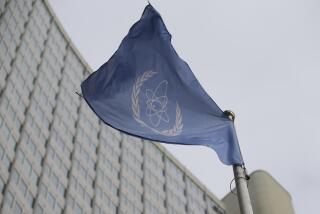Iran Says It Is Now Enriching Uranium
VIENNA — Shrugging off an ultimatum from the U.N. nuclear watchdog, Iran disclosed Tuesday that it had started converting tons of raw uranium as part of a process that could be used to make nuclear arms.
Tehran also continued to insist that its purpose was only to produce electricity. Conversion of raw uranium can produce material for generating electricity or highly enriched fuel for nuclear bombs.
Describing Iran as a victim of “pressures imposed by the United States,” Vice President Gholamreza Aghazadeh said that, of the more than 40 tons of uranium being mined for enrichment, “some has been used.”
Aghazadeh did not detail the stage of conversion or the amounts involved.
President Mohammad Khatami said his country was determined to exercise its right to peaceful nuclear technology -- even at the risk of severing ties with the U.N.’s International Atomic Energy Agency, thereby removing all international oversight.
“We will continue along our path even if it leads to an end to international supervision” of Iran’s nuclear activities, Khatami said at a military parade in Tehran.
Iran is not prohibited from enrichment by its obligations under the Nuclear Nonproliferation Treaty. But for months, it has faced international pressure to suspend such activities as a good-faith gesture.
Aghazadeh suggested that Iran’s course remained open, saying his government would “decide on the basis of our national interests” what to do.
Even before his comments, the large scale of Iran’s project had heightened concerns that the nation was preparing for full uranium enrichment at its Esfahan facility, going beyond laboratory testing.
Suspicions that the Iranian government might be striving to produce atomic weapons have risen since revelations last year that it had run a clandestine enrichment program for 18 years.
The International Atomic Energy Agency’s 35-nation board of governors unanimously adopted a resolution Saturday demanding that Iran freeze all uranium enrichment -- including conversion -- and warned that it could face action by the U.N. Security Council, which could impose sanctions.
It specifically expressed alarm at the conversion plans involving the more than 40 tons of raw uranium.
Converted into uranium hexafluoride and repeatedly spun in centrifuges, the amount could yield more than 200 pounds of highly enriched, weapons-grade uranium. Experts say that would be enough for five crude nuclear weapons.
IAEA spokeswoman Melissa Fleming said the agency had been “notified for some time about the conversion test” and was monitoring activities at the site in Esfahan.
She said, however, that IAEA chief Mohamed ElBaradei “continues to call on Iran, as did the board, to suspend such a test as part of their confidence-building measures.”
More to Read
Sign up for Essential California
The most important California stories and recommendations in your inbox every morning.
You may occasionally receive promotional content from the Los Angeles Times.









